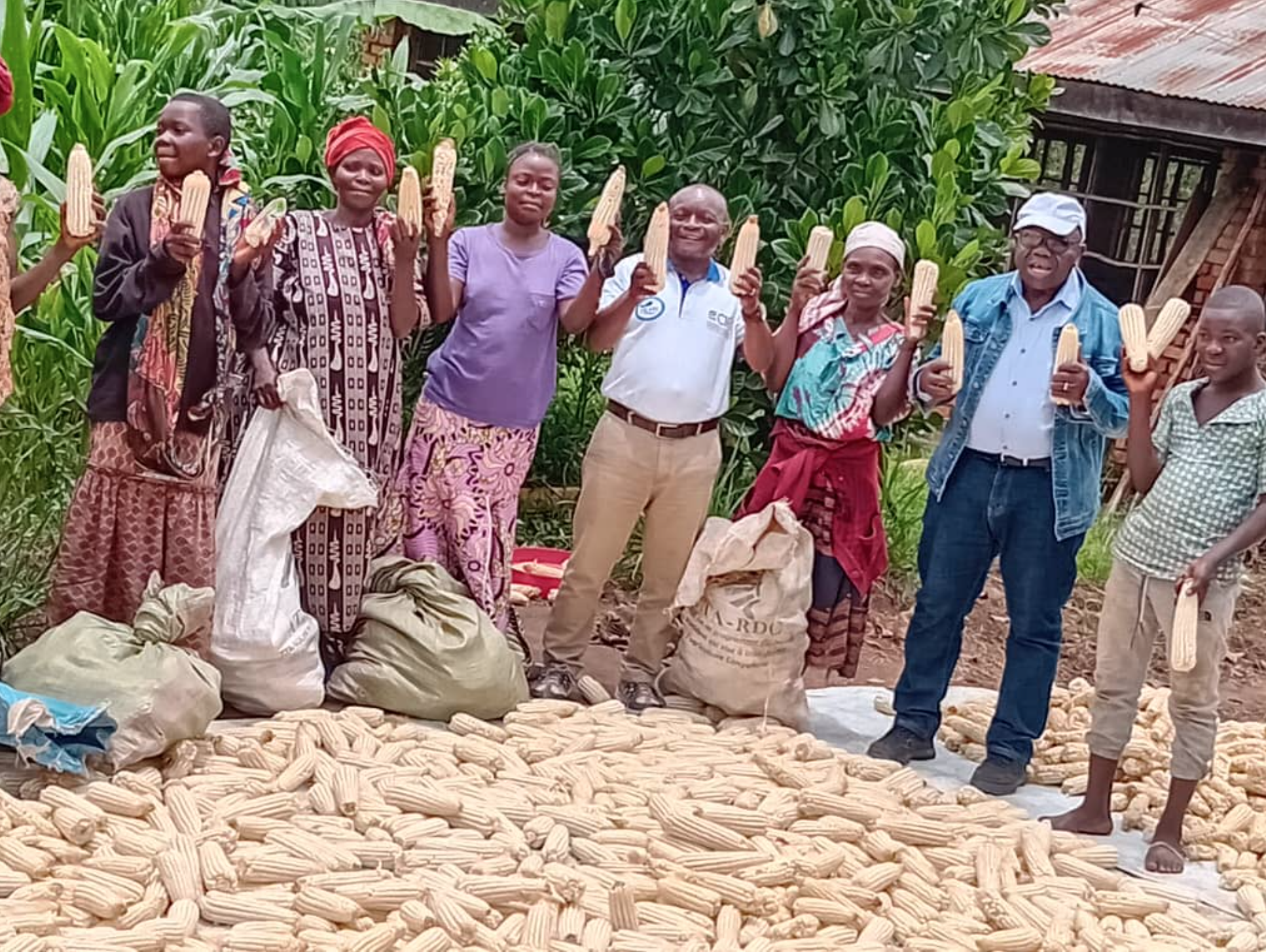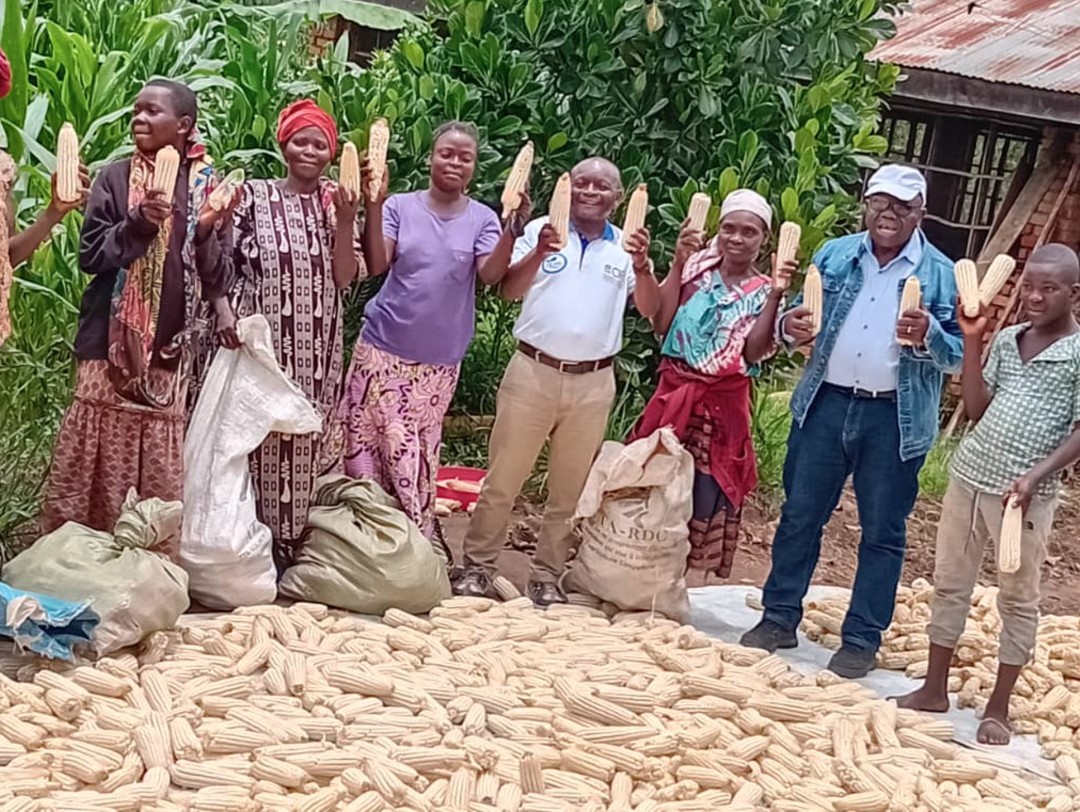
Mr. Herman Mutabataba, Founder and Director of AGRIFORCE, seed company in Bukavu and scaling partner of AID-I GLR project, poses next to his hybrid maize seed production field in Nyangezi. More than 14 ha of hybrid maize seed produced in Bukavu, for the first time under the partnership of Seed Systems Group in the AID-I GLR project.
Although maize and beans are part of the major staples most consumed by many households for livelihood in several districts of the South Kivu province, their production has been hampered over the years by serious challenges such as depleted soils, diseases, and limited access to quality seed. The impact has been harmful on food supply, the consumer basket, and income, particularly for South Kivu’s farmers whose economic situation continues to decline due to poor yields.
Two such farmers are Mr. Pierre Zibishere Mwenga, a 37-year-old farmer and father of eight from Luvungi location, Uvira District, and Ms. Stéphanie Munyerenkana Cizungu, 38, mother of seven, from Kavumu, Kabare District.
Maize yields were far below 1.5 tons per hectare (t/ha), while beans yielded less than 1 t/ha. This was mainly due to rudimentary farming methods, bulk sowing, poor seeds, and lack of sound soil fertilization/conservation. All of these hinder agricultural production.
To redress the situation, the Great Lakes Accelerated Innovation Delivery Initiative Rapid Delivery Hub (AID-I GLR) project introduced innovative farming practices and techniques to improve yields. Using improved high-quality and disease-resistant seeds, fertilizer application combining organic and inorganic fertilizer, row sowing, and right planting spacings (both in and between the rows) resulted in increased yields: a farmer growing maize currently gets5 t/ha while growing beans provides 1.3 t/ha (compared to previous lower yields above).

In South Kivu, DRC, farmers proudly showcased their harvest from the hybrid maize seeds (WE 5117) provided by Agriforce Seed Company through the AID-I GLR project
The high-yield seeds were provided by seed companies and agro-dealers supported by the AID-I GLR initiative.
“Thanks to the training provided by Rikolto, in the framework of AID-I GLR, we learnt how to sow in compliance with agronomic standards/requirements. Each of us also received a package of high-quality varieties of bean and maize seeds, as well as tomato seeds. We noticed a huge difference – by way of yield boost – whenever we abide by the specified requirements and apply organic fertilizer in addition to using quality seed, said Pierre, the farmer mentioned above.
“The 100 grams of maize seed I had received allowed me to harvest 24 kilos from a 50-square-meter plot. From the 100 grams of bean seed I received, I managed to reap 2 kilos from a 15-square-meter area. I believe this improvement is due to the good quality of the seed [with disease-resistant and climate-smart characteristics], coupled with other inherent outstanding characteristics for optimal performance, among other merits,” he adds,.
In preparation for the next growing season, Pierre has purchased improved seed from a designated agro-dealer: 25 kilos of maize seed to sow on a 1-ha field and 16.3 kilos of bean seed to plant on 0.25 ha. He expressed his willingness to pass on to other farmers the cultivation skills/know-how learnt from Rikolto, in order to help them also improve their yield.
As part of the efforts to support and empower farmers, AID-I GLR helps them revamp and reorganize the agro-dealer sector in order to make it easy for them to access the right seed nearby, in a timely manner and at affordable costs.
For example, Ms. Stéphanie Cizungu, the farmer mentioned above, is also an agro-dealer trading in seed. She sees this approach as a great help to farmers in her Kabare District.
According to Stéphanie, based on her experience gained over a year of dealing in the seed sector, certified seeds sales account for a 60% increase in 2024 compared to 2023, becoming more profitable than trading in non-certified seeds. She recalls that previously, agro-dealers would hardly find buyers for their seeds. But thanks to the training provided by AID-I GLR through Rikolto, besides the sales strategies imparted, seed demand has increased.
“Of late, we have been making enough profits that allow us to cater for our children’s school fees, on top of meeting other essential household needs,” says Stéphanie.
Regarding the above-mentioned innovations, the lessons learned from this project should not be overlooked. For instance, the seed-based economy requires reform for greater efficiency. Also required is pragmatism along certain value chains, entrenched in a policy – with due regard to both national and provincial scales – promoting a seed system and strategy that values local lines, in collaboration with State-led institutions Institut National pour l’Étude et la Recherche Agronomiques (INERA) and Service National de Semences (SENASEM).




No Comments